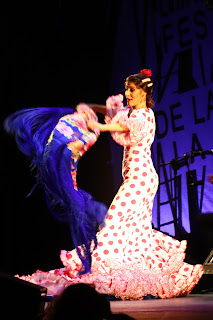I've just finished a book by a Spanish author. The basic premise is that her main character moves to London looking for work and ends up working in a bookshop where her life takes a turn for the better. It was an enjoyable, if slight, read, a bit like one of those US Christmas films where the hero rediscovers the joy and warmth of small town life. What struck me most about the book was that it was loaded with Spanish clichés about England and that it repeatedly and wantonly ascribed Spanish habits to Britons.
One of the principle things, that turned up time and time again throughout the book was tea. Gallons of tea. I suppose that's because lots of Spaniards truly believe that England stops for tea and a bun at 4pm. It happened in the book over and over again. The characters drank Earl Grey brewed in fine porcelain teapots and when they were not tucking into cakes they could rely on an unending supply of dainty cucumber sandwiches. The protagonist and her love interest even go to Fortnum and Mason's to drink tea at one point. There is no mention of sitting at your desk, drinking tea from stained mugs with pictures of cats on them and having to squeeze the teabag with your fingers because there are no spoons.
Drake, Sir Francis, not the Canadian musician, and Holmes, Sherlock as in 221b Baker Street, get a few mentions as does New Scotland Yard. For some reason Spaniards know these names. It's a bit like the way that the TV news here always says Boris Johnson's Government but doesn't name Macron when speaking of the French Government. Pirate, by the way, always appears in any sentence that describes Frank Drake. In this book the owners of the pub have the surname Drake and, when they are first introduced, the phrase is that they denied any link to the famous pirate elevated to the knighthood. The pub run by the Drakes is called the Darkness & Shadow which reminded me of the pub in, I think, the Reggie Perrin books, called the Desiccated Kipper. It's a bit different to most English pubs, but a lot like a Spanish bar, in that you order your drinks from the table and people serve them to you. Given my minimal bar presence I must seek it out the next time I'm near Earl's Court.
There are lots of things that we English apparently do that I missed out on when I lived there. It is, of course, possible, that they are common now. For instance, in the book, English shops wrap things bought as presents at Christmas time just as they do in Spain. When the owner of the bookshop closes for the evening he puts down a metal shutter blind. In the UK I only remember those metal roller blinds from areas like Hulme in Manchester though I have no idea if Hulme is still dodgy or not. The bookshop is in Temple though and last time I was there it bore very little resemblance to the Mancunian badlands. There's a likeable if swotty lad in the book, named Oliver Twist, and his mid afternoon snack is bread stick into which solid lumps of chocolate bar chocolate have been pushed. It's Spanish comfort food but I don't think it's an English staple. Now if he'd had a sugar sandwich! I've heard that Britons are now very outwardly emotional and have embraced touchy feely behaviours but I don't think the smacking lips, air kisses to both cheeks are common yet - they are in the book, just as they are in Spain. Oh and Christmas Eve is when families get together for a big family meal just as they do on New Year's Eve. And so it goes.
No I can't stop. Here are a couple more to finish. There are a few spelling mistakes, Spaniards find English letter sequences troubling at times just as we Brits stumble over Spanish words. They are going to go to Candem (sic). The best spelling mistake though led to an interesting factlet. It's another Fortnum and Mason mention. The book says that the shop's owners invented Scott eggs (sic again) as easy to eat food for Victorian travellers. Actually there was also mention of an English urban myth that was new to me. It seems that many of us think it is an offence to eat meat pies on Christmas Day. I did read the Wikipedia to check and it seems to have something to do with why mince pies are not meat pies. I forget the details though.
Hasta la vista, baby.
























